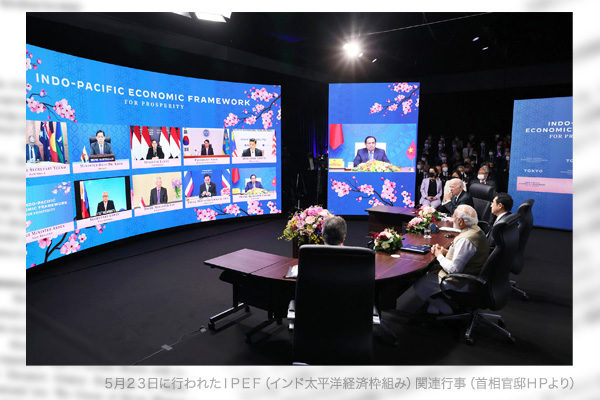Official agreement has been reached to launch negotiations on the Indo-Pacific Economic Framework for Prosperity, or IPEF. The new economic initiative is strategically significant for securing the United States’ engagement in Asia to counter rising China.
Asian countries had initially been hesitant to join IPEF but have decided to participate with their top leaders’ strategic judgements. But they are loath to take a confrontational stand against China, excluding a tinge of confrontation from their statement on the agreement.
Asian participants to get Japan-led benefits
Whether IPEF could provide actual economic benefits to Asian countries is the key to successful negotiations. The U.S. Biden administration has excluded trade liberalization through tariff cuts from the framework in view of domestic resistance. In order to retain Asian countries, IPEF must provide them with actual benefits in place of access to the U.S. market.
Of the four IPEF negotiation pillars, the “supply chain” and “clean economy” can provide them with such benefits.
The “supply chain” pillar is planned to develop arrangements for communications among IPEF partners in the case of semiconductor and medical material supply disruptions. Japan has already tackled initiatives for the development along with other Asian countries. These initiatives have been redesigned for IPEF.
The “clean economy” pillar will support investment in infrastructure for decarbonization. The focus is an “investment in transition.” Many Asian countries cannot but to depend on fossil fuels for the time being, being unable to make quick transition to renewable energy as western countries do. Asian countries may utilize ammonia and hydrogen under a realistic approach during a transitional period towards decarbonization. The pillar will support this approach under Japan’s championship. Japan will play a key role in dealing with radical environmentalists within the Biden administration.
Asian countries cautious of U.S. imposing of rules
The IPEF “trade” pillar is a matter of concern. U.S. Trade Representative Katherine Tai in charge of the pillar emphasizes IPEF as an innovative framework to lead rule-making for the 21st century. But Asian countries are cool. As might have been expected, India decided not to participate in the “trade” pillar. Other Asian countries may follow.
The rule-making represents the Biden administration’s desire to attract support from domestic environmentalists and trade unions by imposing environmental and labor conditions on other countries. Regarding digital trade, the U.S. administration has American-style freedom-oriented data distribution rules in mind. Asian countries are cautious of Washington’s attempt to impose U.S. rules on them.
Viewpoint of reforming international order
While there are abovementioned challenges regarding IPEF, it is also important to take IPEF in a big picture as a framework to reform international order.
Supporting globalization after the Cold War has been international order under the slogan of trade liberalization. The World Trade Organization typically represents the order, which also includes regional trade liberalization agreements such as the Regional Comprehensive Economic Partnership and the Comprehensive and Progressive Agreement for Trans-Pacific Partnership.
In the current age of a big-power game, however, international order is to be built around economic security, as indicated by the recent launch of the Japan-U.S. economic 2-plus-2 between foreign and economic ministers and the Japan-U.S.-Australia-India Quadrilateral Security Dialogue. IPEF also features economic security or the enhancement of supply chains as glue to stick participants together.
IPEF must thus be located in the overall trend of international order. Japan must acknowledge itself as the leader of all these frameworks.
Masahiko Hosokawa is a professor at Meisei University and a former director-general of the Trade Control Department at Japan’s Ministry of Economy, Trade and Industry. He is also a Planning Committee member at the Japan Institute for National Fundamentals.


